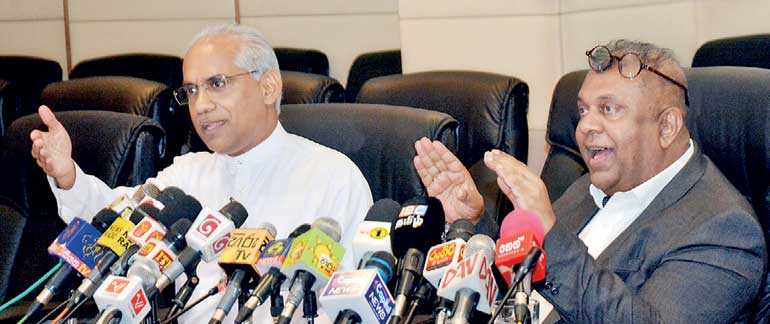Monday Feb 16, 2026
Monday Feb 16, 2026
Saturday, 14 July 2018 00:25 - - {{hitsCtrl.values.hits}}

A chorus? Finance Minister Mangala Samaraweera and State Finance Minister Eran Wickramaratne simultaneously gesture at the media briefing yesterday - Pic by Upul Abayasekara
By Charumini de Silva
Finance Minister Mangala Samaraweera yesterday levelled a scathing criticism against former President Mahinda Rajapaksa for misleading the public on the new fuel price formula, claiming his conduct was “unbecoming of a senior politician of the country”.
“The former President who was also Finance Minister is trying to influence the general public without fully acknowledging the facts. I would like to remind him that the fuel prices with the latest revision under this Government are still lower than what it was during his tenure,” Samaraweera told journalists.
Denying all allegations levelled against him, the Minister challenged the former President again to a public debate to “clear all the facts”.
“As a senior politician in the country, it is sad to see Mahinda Rajapaksa stoop down to low levels. I think it is better we clear the facts in an open debate and let people of this country know the truth,” the Minister challenged. The Minister denied Rajapaksa’s accusation that the price revision was done to increase Government revenue insisting that the country’s economy was progressing on a strong foundation after many years.
Denying the allegation that pricing formula was brought in to increase Government revenue, Samaraweera said Rajapaksa used his Executive powers to disobey the Supreme Court when it ordered the then Government to reduce the price of a petrol litre, as they were covering up the oil hedging deal.
Likening the infamous hedging deal during the Rajapaksa tenure to a ‘gamble’ between former Central Bank Governor Ajith Nivard Cabraal and Rajapaksa, which cost the Government coffers Rs. 10.2 billion.
“I have done an investigation on Nivard’s deals, which will be exposed soon,” he added.
Samaraweera also noted that it was during Rajapaksa’s tenure that the rupee depreciated overnight from Rs. 110.57 to Rs. 127. The Minister said the strengthening of the dollar had not only impacted the Sri Lankan Rupee, but it had an effect on regional economies as well. Thereby, he called on the general public not to get flustered unnecessarily.
Samaraweera said according to the Cabinet approval given this week the Government will revise fuel prices on the 10th of every month, deviating from the initial plan of a bi-monthly review on the fifth day.
“During the discussion, I suggested we change it every week, but the Ceylon Petroleum Cooperation (CPC) rejected to changing it weekly or daily. However, we will consider a weekly review in future,” he quipped.
The Minister also emphasised on giving more teeth to the Consumer Affairs Authority (CAA) to monitor errant traders taking undue advantages of the fuel price fluctuations, while adding that they were considering in bring in a new Act as the present legislation was not strong enough to take necessary action.
State Finance Minister Eran Wickramaratne said the pricing formula was the best mechanism to determine fuel prices and had been successfully practiced around the world.
He also said just like the price formula increases prices when international oil price surge, the benefits will be passed on to when it declines, which is a highly-accepted and transparent methodology.
Wickramaratne claimed the benefits of the fuel price subsidies were disproportionately enjoyed by the rich in the country, noting that the most affluent 10% of the population enjoyed 31% of the benefits of the subsidised fuel prices.